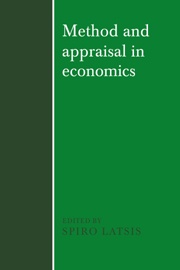Book contents
- Frontmatter
- Contents
- Preface
- A research programme in economics
- Economics and psychology: the death and resurrection of a research programme
- Schools, ‘revolutions’ and research programmes in economic theory
- Anomaly and the development of economics: the case of the Leontief paradox
- From substantive to procedural rationality
- Kuhn versus Lakatos or Paradigms versus research programmes in the history of economics
- On the history and philosophy of science and economics
- ‘Revolutions’ in economics
- Index
‘Revolutions’ in economics
Published online by Cambridge University Press: 23 November 2009
- Frontmatter
- Contents
- Preface
- A research programme in economics
- Economics and psychology: the death and resurrection of a research programme
- Schools, ‘revolutions’ and research programmes in economic theory
- Anomaly and the development of economics: the case of the Leontief paradox
- From substantive to procedural rationality
- Kuhn versus Lakatos or Paradigms versus research programmes in the history of economics
- On the history and philosophy of science and economics
- ‘Revolutions’ in economics
- Index
Summary
The study of scientific ‘revolutions’, in which one system of thought (or ‘research programme’) has given place to another, has been shown, in several of the preceding essays, to be a powerful tool in the methodology of natural science. Economics also has had its ‘revolutions’; it is fruitful to study them in much the same manner. I think however that when one looks at them comparatively, one finds that their significance is very largely different.
This is a matter of importance, for economics itself. Economics is more like art or philosophy than science, in the use that it can make of its own history. The history of science is a fascinating subject; it is important (as-has been shown) for the philosophy of science; but it is not important to the working scientist in the way that the history of economics is important to the working economist. When the natural scientist has come to the frontier of knowledge, and is ready for new exploration, he is unlikely to have much to gain from a contemplation of the path by which his predecessors have come to the place where he now stands. Old ideas are worked out; old controversies are dead and buried. The Ptolemaic system may live on in literature, or it may form the framework of a mathematical exercise; it has no direct interest to the modern astronomer.
Our position in economics is different; we cannot escape in the same way from our own past.
- Type
- Chapter
- Information
- Method and Appraisal in Economics , pp. 207 - 218Publisher: Cambridge University PressPrint publication year: 1976
- 44
- Cited by

